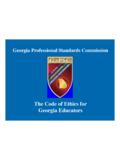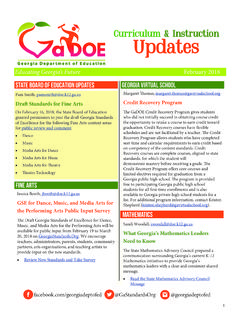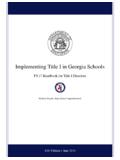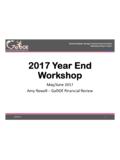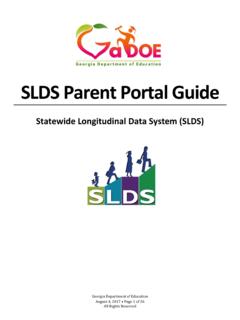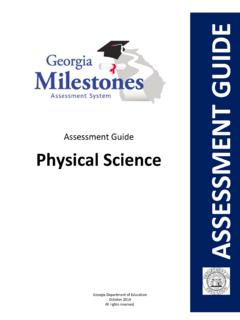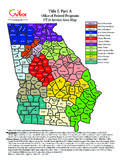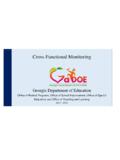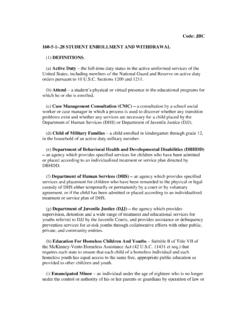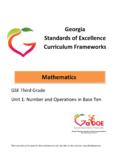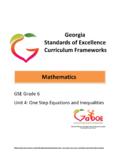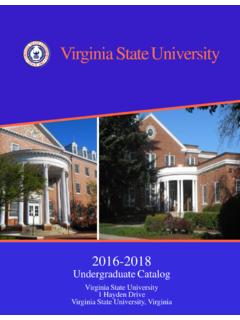Transcription of G E O R G I A D E P A R T M E N T O F E D U C A T I …
1 g e o r g i a d e p a r t m e n t o f e d u c a t i O N VISION 2020 EDUCATING georgia S FUTURE MISSION | OFFERING A HOLISTIC EDUCATION TO EACH AND EVERY CHILD IN OUR STATE. VISION | EDUCATING georgia S FUTURE BY GRADUATING STUDENTS WHO ARE READY TO LEARN, READY TO LIVE, AND READY TO LEAD. By 1. Every child will have access to georgia -owned and georgia -grown standards, and teachers will have access to high-quality instructional resources and support. 2. Every child in georgia will be on a path to being proficient in reading by third grade and being proficient in math by fifth grade. 3. georgia will exceed the national average graduation rate. 4. Every child in georgia will earn college and/or career credit before they graduate high school. 5. The number of high-stakes tests will be reduced to the federal minimum while support for diagnostic tools in all core content areas will be provided.
2 6. Every child in georgia will have access to a STEM or STEAM certified school. 7. Every child in georgia will have access to computer science and fine arts learning opportunities. 8. Every teacher and leader in georgia will have access to high-quality, relevant, personalized professional learning. 9. State and federal processes, procedures, and policies will be streamlined and integrated in order to provide maximum flexibility to districts while ensuring transparency to taxpayers. 10. Increase the number of georgia districts that meet or exceed the goals of their performance contracts through innovative practices, academic growth, and stakeholder engagement. 11. Seventy (70%) percent of public schools will achieve a 4 or 5 star climate rating. 12. By the start of the 2020 school year, at least 20% of the required menu for the student meal will be comprised of georgia Grown products.
3 13. Every elementary and middle school student will have access to at least 30 minutes of physical activity per day. 14. Ensure an open and clear line of communication to the georgia Department of Education and continual opportunities to provide meaningful, ongoing feedback. Learn more about GaDOE s Strategic Plan ( ) and Our Focus ( ). VISION 2020 Educating georgia s Future 2 | georgia Department of Education | | Richard Woods, georgia s School Superintendent STRATEGIC FOCUS | REVISE/DEVELOP AND IMPLEMENT VIABLE ACADEMIC STANDARDS THAT ENGAGE LEARNERS WITH ESSENTIAL KNOWLEDGE, SKILLS, AND ENDURING CONCEPTS By Every child will have access to georgia -owned and georgia -grown standards, and teachers will have access to high-quality instructional resources and support. georgia s newly adopted georgia Standards of Excellence in Social Studies and Science were developed using the expertise of georgia s classroom teachers and post-secondary institutions and input from georgia s stakeholders.
4 Though national standards existed, georgia created a set of standards that were developed specifically for the students and teachers of our state. Working with teachers, the georgia Department of Education is refining its Teacher Resource Link (TRL) so it can organize and deliver high-quality instructional resources, professional learning, formative assessment tools, and interventions/strategies in a more teacher-friendly way. This tool doesn t tell teachers how to teach, but provides them with a menu of quality resources and tools that can personalize the learning of their students. Just as learning doesn t stop within the walls of a school, access to internet connectivity can t either. The georgia Department of Education has worked in partnership with the Office of Student Achievement to increase bandwidth to schools, strengthen and expand wired and wireless networks, and support devices for students and we must continue to expand to meet the growing needs of student learning.
5 These tiers of technology support must be expanded to include a community tier where parents, students, and educators have 24/7 access to high-quality instructional resources and support. STRATEGIC FOCUS | INCREASE THE PERCENTAGE OF K-5 STUDENTS WITH A STRONG KNOWLEDGE OF FOUNDATIONAL SKILLS AND CONCEPTS By Every child in georgia will be on a path to being proficient in reading by third grade and being proficient in math by fifth grade. The critical work of Governor Nathan Deal and First Lady Sandra Deal has laid a firm foundation for an increased focus on literacy and numeracy skills. A firm foundation of the fundamentals in the early grades ensures strong success in the latter grades. Since 2011, the Striving Readers grant project has led to increased literacy outcomes for 100% of the 328 georgia schools served.
6 The project improved learning among elementary, middle, and high school students and dramatically changed the trajectory for struggling learners. Overall, 70% of students met or exceeded growth expectations. Lessons learned and best practices will be scaled up to support literacy efforts across the state. A Literacy Think Tank, representing over 50 literacy professors from georgia s colleges and universities, was formed to create an action plan for improving literacy preparation for new teachers. The georgia Department of Education teamed up with the Get georgia Reading Campaign to hold 15 community meetings across the state. Using the Get georgia Reading pillars of Language Nutrition, Access, Productive Learning Climate, and Teacher Preparation and Effectiveness, these partners highlighted six building blocks for laying a strong foundation of literacy skills: Engaged Leadership, Continuity of Instruction, Formative and Summative Assessments, Tiered Supports, Community Partnerships, Professional Learning.
7 Based on these building blocks, the georgia Department of Education has created a statewide literacy plan. VISION 2020 Educating georgia s Future 3 | georgia Department of Education | | Richard Woods, georgia s School Superintendent The georgia Department of Education is developing tools to assist districts with utilizing both local and state literacy data and identified best practices and strategies to ensure their students are on a path to reading and numeracy proficiency. Media specialists and public librarians are an essential part of curriculum support and lifelong learning by ensuring access to books, resources, and programming during and after school hours. Partnering with the georgia Public Library Service, the georgia Department of Education held three events across the state to spotlight summer reading and to urge families to sign up for library cards.
8 Through partnerships with the Get georgia Reading Campaign, students had access to more than 10,000 free digital titles and together, they read more than 200,000 books. Over 100,000 books were donated to students, media centers, and libraries. Working with the 21st Century Community Learning Centers program, books and lessons were shared with students along with information about access to e-books and how to get a public library card. Partnering with the georgia Public Library Service, we will work to ensure that every georgia student graduates school, not only with a diploma, but with a public library card in hand. The georgia Department of Education also sends out a monthly newsletter for media specialists and will be holding a series of events to get their input and pull together best practices and resources.
9 With the passage of 2015 s Senate Bill 364, districts have been given the opportunity to eliminate Student Learning Objectives (SLOs). This gives teachers the flexibility to work collaboratively to shore up literacy and numeracy instruction across content areas. The georgia Department of Education will develop and curate resources to help non-ELA and Math teachers to infuse literacy and numeracy skills naturally within their own instruction. Senate Bill 364 s focus on literacy and numeracy skills in the early grades continued with a new formative assessment tool for grades 1 and 2. Learn more about GaDOE s efforts to support literacy: Learn more about GaDOE s L4: Literacy for Learning, Living and Leading Plan: STRATEGIC FOCUS | INCREASE THE PERCENTAGE OF HIGH SCHOOL GRADUATES WHO ARE COLLEGE AND/OR CAREER READY By georgia will exceed the national average graduation rate.
10 With positive policy changes coupled with increased options for students and support for teachers, georgia s graduation rate has continued to rise. Working with fifty school districts, the georgia Department of Education s Student Success: Imagine the Possibilities plan has increased the graduation rate for students with disabilities by 19%. Students who complete a Career Pathway have a graduation rate and students who enroll in just one Advanced Placement (AP) course have a 97% graduation rate across subgroups of students. The GaDOE has focused on providing new paths to a high school diploma one diploma, with multiple paths to get there. With the development and adoption of Computer Science, Foundations of Algebra, and Math Ready courses, students have more ways to earn core content credit by taking relevant coursework.
